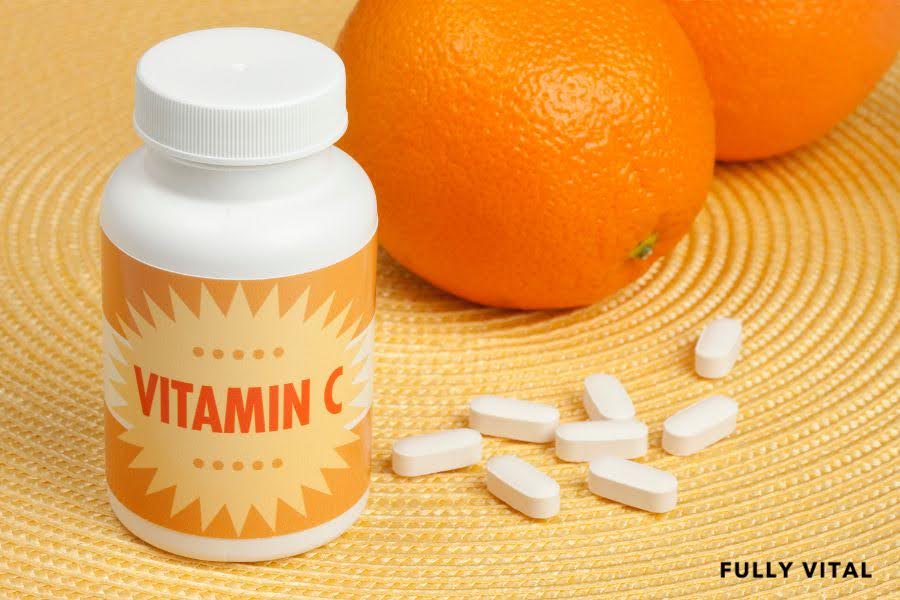
Antioxidant Power: How Vitamin C Revitalizes Your Hair
When it comes to upgrading our health and beauty routines, Vitamin C is often hailed as a go-to powerhouse, especially for the skin.
But there's more to this essential nutrient than meets the eye — it's also a pivotal player in the world of hair care.
Vitamin C is fundamental for maintaining the strength and integrity of our locks, stimulating growth, and even guarding against common hair woes.
It’s crucial we cover this topic because of the profound, yet often overlooked impact it has on maintaining lush and vibrant hair.
Harness the power of Vitamin C with Fully Vital's hair growth essentials—designed to invigorate your hair from root to tip.

I LOVE MY HAIR NOW
FullyVital hair serum and hair vitamins made tremendous improvements in my hair. I truly love my hair now.
Shop Hair ProductsWhat Is Vitamin C?
The Basics Of Vitamin C And Its Importance
Vitamin C, also known as ascorbic acid, is a crucial nutrient that supports various cellular functions of the body.
It's a water-soluble vitamin, which means it dissolves in water and is delivered to the body's tissues but is not well stored, so it must be taken regularly through diet or supplements.
Vitamin C is revered for its healing properties, immune support, and role as an antioxidant.
But beyond these, it's a linchpin in the synthesis of collagen, an essential protein that forms the building blocks of hair, skin, and nails.
Vitamin C In The Context Of Hair Health
For our hair, Vitamin C is more than just a supplement—it's a foundational component that ensures the integrity and health of the hair.
Its primary role is collagen production, a protein that makes up the hair structure, offers elasticity, and gives strength to the hair shaft, preventing breakage and split ends.
Vitamin C also aids in protecting the scalp from oxidative stress by nullifying free radicals that can damage hair follicles, thus maintaining a conducive environment for healthy hair growth.
With its diverse roles, Vitamin C stands out as a critical nutrient in the journey to achieving a full and healthy mane.
How Does Vitamin C Promote Hair Growth?
Collagen Production And Hair Strength
Collagen's relationship with hair is inseparable; it wraps around each hair strand, providing strength and support.
Vitamin C's role in collagen synthesis is indispensable as it acts as a co-factor in the conversion of proline into hydroxyproline, which is then woven into the sturdy triple helix of collagen.
This structural support mitigates damage from daily wear and tear and environmental stressors, making hair resilient and less prone to breakage.
Antioxidant Effects And Scalp Health
Vitamin C's antioxidant prowess extends to the scalp as well.
It neutralizes free radicals that can damage the scalp and hair follicles, potentially leading to hair loss or impaired hair growth.
A healthy scalp is akin to fertile soil for a plant; it's the environment from which strong hair springs.
Regular intake of Vitamin C ensures the scalp is fortified against oxidative stress, creating ideal conditions for continued hair growth.
Enhancing Iron Absorption For Hair Nourishment
Iron is vital for hair growth, but without enough Vitamin C, the body can't absorb iron efficiently from plant-based sources.
Vitamin C helps convert iron into a form that is more readily absorbed, ensuring that iron reaches the hair follicles to stimulate growth.
This symbiotic relationship underscores the importance of a diet rich in both nutrients to maintain hair health and prevent hair loss associated with iron deficiency.
Best Way To Take Vitamin C For Hair Growth?
Dietary Sources Vs. Supplements: What's Best For Hair?
While supplements are a convenient way to increase Vitamin C intake, they might not always be necessary if you include plenty of Vitamin C-rich foods in your diet.
Foods like oranges, strawberries, red peppers, and kale not only provide Vitamin C but also a wide array of other nutrients that benefit hair growth.
If dietary intake is insufficient, or if an individual has higher requirements (such as during times of illness or stress), supplements can help ensure adequate levels.
Understanding The Right Dosage For Hair Benefits
The Recommended Dietary Allowance (RDA) for Vitamin C is 75 mg for women and 90 mg for men per day.
Exceeding this amount is not typically needed and can lead to adverse effects.
It's essential to find a balance that supports hair health without crossing into excessive intake.
Always consider consulting with a healthcare provider before beginning any supplement regimen.
The Synergy Of Nutrients And Maximizing Hair Growth
Vitamin C doesn't work alone.
It acts synergistically with other nutrients, such as vitamin E, zinc, and biotin, to support hair growth.
Combining a healthy intake of these nutrients can enhance the effectiveness of Vitamin C, providing a comprehensive approach to hair health.
Remember, a balanced diet is crucial, and relying solely on supplements for hair growth isn't a silver bullet.

Does Vitamin C Deficiency Affect Hair?
Recognizing The Signs Of Vitamin C Deficiency In Hair
Hair can be a reflection of our nutrient intake.
A deficiency in Vitamin C can have specific tell-tale signs, including hair that is dry, weak, or prone to breakage.
You may also notice slower growth rates and increased hair loss.
These symptoms can signal the need for more Vitamin C, and possibly other nutrients, in your diet.
Addressing Deficiency To Prevent Long-Term Hair Damage
Persistent Vitamin C deficiency can lead to chronic hair health issues, such as significant hair thinning and increased brittleness.
Addressing the deficiency promptly through diet or supplements can help restore hair health but must be done under the guidance of a healthcare provider.
It's also essential to consider an integrated approach to hair care that includes stress management, proper hydration, and scalp care.
Can I Apply Vitamin C Directly On Hair?
Topical Benefits: Exploring Vitamin C Hair Products
Applying Vitamin C directly to the hair can provide benefits, such as protecting the hair from UV damage, and improving shine and texture.
However, choosing the right product is crucial, as the scalp and hair have different needs compared to the skin.
Look for products specifically formulated for hair use, with appropriate pH levels and concentration.
How To Choose Between Diy And Commercial Vitamin C Hair Products
While commercial products are formulated with stability and specific hair needs in mind, DIY treatments offer a natural and custom approach.
When deciding between the two, consider factors like convenience, cost, and personal preference for natural ingredients.
DIY recipes using lemon juice or powdered vitamin C can be effective but require careful preparation to avoid over-acidity, which can damage hair.
Application Tips: Getting The Most Out Of Topical Vitamin C
For those opting for topical applications, timing, and method matter.
After cleansing the scalp and hair, apply a Vitamin C-enriched serum or treatment, and leave it in as advised on the product's label.
This maximizes the nutrient's contact with the scalp and hair, allowing for optimal absorption.
Furthermore, limiting the use of heat styling tools can help preserve Vitamin C's benefits and prevent further damage.

Is Vitamin C Suitable For All Hair Types?
Assessing Vitamin C's Effectiveness Across Different Hair Textures
Every hair type can benefit from Vitamin C, but how it's used can vary.
Fine hair might require lighter, spray-on products, while thicker hair could benefit from richer serums.
It’s important to start with small amounts to monitor how your hair responds and adjust usage accordingly.
Special Considerations For Color-Treated Hair
Color-treated hair requires cautious use of Vitamin C as it can potentially lighten hair color or react with the dye.
Conducting a patch test or consulting with a hair care professional before full application is wise to prevent unintended alterations to hair color.
Customizing Vitamin C Use For Your Hair Type
Ultimately, customization is key when incorporating Vitamin C into any hair care routine.
People with oily scalps might prefer lighter, water-based products, while those with dry, brittle hair might opt for more intensive treatments.
Understanding your hair’s needs and response to Vitamin C will enable you to create an effective, personalized regime.
Discover The Power Of Fully Vital Hair Growth ProductsAt Fully Vital, we understand the frustration and concern that comes with the aging of your hair. That's why we have developed a range of hair growth products that are designed to stop and reverse the aging process, giving you healthier, more resilient locks. Here are some key features and benefits of our products:
|
Frequently Asked Questions About Vitamin C
Vitamin C's significant role extends far beyond its well-known immune-boosting powers; it stands as a pivotal contributor to hair health.
This nutrient supports collagen production, vital for maintaining the strength and structure of hair, and it aids in the absorption of iron, a mineral crucial for hair growth.
For those dealing with hair concerns, incorporating Vitamin C into your diet or hair care routine can be a game-changer.
Nourishing your hair starts at the roots.
Let Fully Vital's Vitamin C-enriched hair growth products unlock your hair's full potential.
Check out our recent blogs:
- Achieve Gorgeous Locks: Your Path With A Reputable Hair Doctor
- Stunning Half And Half Hair Ideas: Transform Your Look Today!
- Hair Sos: How To Eliminate Stubborn Cowlicks For Good
Can I get enough Vitamin C for hair growth from my diet?
Yes, a balanced diet rich in fruits and vegetables such as citrus fruits, berries, and leafy greens can provide enough Vitamin C to promote hair health and growth.1
Are there special considerations for using Vitamin C on color-treated hair?
Vitamin C may lighten or alter the color of dyed hair.
Those with color-treated hair should use Vitamin C products cautiously and conduct a patch test or consult with a hair care professional beforehand.2
Is it possible to use too much Vitamin C on my hair?
Excessive use of Vitamin C, especially in the form of topical preparations, can lead to hair dryness and scalp irritation.
It's important to follow product directions and avoid overuse.3
Will Vitamin C help if I am experiencing hair loss?
Vitamin C can support hair health by contributing to collagen production and enhancing iron absorption, which may help in cases where hair loss is related to nutrient deficiencies.4
Can men also benefit from Vitamin C for hair growth?
Absolutely, men can benefit from Vitamin C for hair growth, as the nutrient's role in collagen production and scalp protection is crucial for both men's and women's hair health.5
How do I choose the right form of Vitamin C for hair care?
Choose based on hair type and capabilities—light formulations for fine or oily hair, and richer products for dry or brittle hair.
Also consider your dietary habits and preferences between natural and commercial products.
Does Vitamin C work well with other hair care ingredients?
Vitamin C can be effective in conjunction with other hair-friendly nutrients such as vitamin E, zinc, and biotin, as long as it does not react negatively with any other ingredients in hair care products, such as certain hair dyes.
How does Vitamin C affect the scalp?
Vitamin C's antioxidant properties can help protect the scalp from oxidative stress.
It also plays a role in maintaining skin health, which is beneficial for the scalp.
Can I remove hair dye with Vitamin C?
Some anecdotal evidence suggests that Vitamin C may help lighten hair color, but there isn't strong scientific backing, and results may vary.
Those wishing to try this should proceed with caution.
How should I incorporate Vitamin C into my hair care routine?
Include Vitamin C-rich foods in your diet, choose hair care products that contain Vitamin C, or use a DIY mask with natural sources like citrus fruit extracts.
Always ensure that any topical application is done so according to the product instructions or a trustworthy recipe for DIY treatments.
sources:
- Nice Hair. (2006). The Link Between Vitamin C and Hair Growth is Crucial. Retrieved from https://www.nicehair.org/the-link-between-vitamin-c-and-hair-growth/.
- Forbes Health. (2024). 11 Best Hair Growth Vitamins And Supplements (2024). Retrieved from https://www.forbes.com/health/supplements/best-vitamins-and-supplements-for-hair-growth/.
- Outlook India. (2024). Best Vitamins for Hair Growth 2024. Retrieved from https://www.outlookindia.com/whats-hot/best-vitamins-for-hair-growth-news-341962.
- Patel, D. P., Swink, S. M., & Castelo-Soccio, L. (2023). The Role of Vitamins and Minerals in Hair Loss: A Review. PubMed Central. Retrieved from https://www.ncbi.nlm.nih.gov/pmc/articles/PMC6380979/.
- Guo, E. L., & Katta, R. (2023). Nutritional Supplementation for Hair Loss: A Systematic Review. JAMA Dermatology. Retrieved from https://jamanetwork.com/journals/jamadermatology/fullarticle/2798840.








